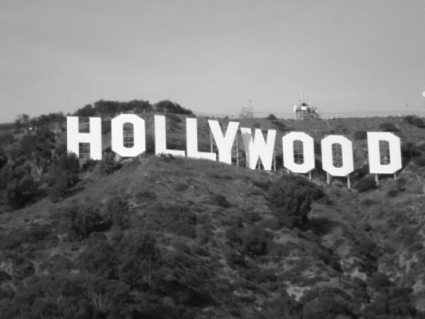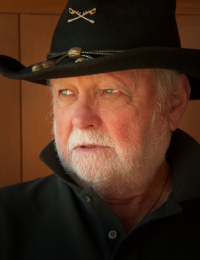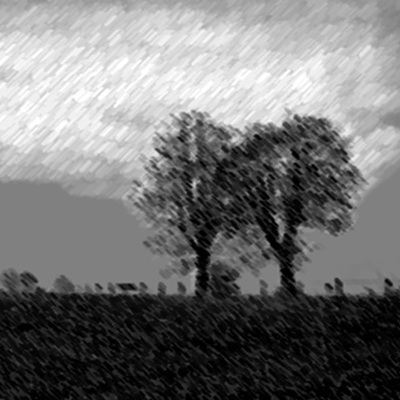.
.
photo via Wikimedia Commons

.
.
A Quick Kill: A Final Episode Among Brothers
by J.S. Kierland
.
…..Three in the morning in the Hollywood Hills feels like five in the morning anywhere else. The coyotes and owls cross the northern boundaries and stray down under the big HOLLYWOOD sign that glistens in the moonlight at the top of Beachwood Canyon. Field mice, possum, snakes, and house cats become fair game for the wild intruders that prowl the narrow streets and canyons for a quick kill and a quiet meal with the family.
….. I nursed my bourbon, waited for the big owl to land on the roof, and listened to the ice tumble in Nicky’s glass as he downed his third quick scotch. He’d come in from New York to record background jazz for a new Spielberg film, and it wasn’t going well. The improvised score wasn’t working like it had in other films and Nicky seemed more disturbed than usual. He was a true New Yorker, born and bred, and remained that way for better or for worse. Hollywood was just the suburbs to Nicky.
….. We managed to avoid talking about the family until he opened one of my dusty liquor bottles and eased into some hard comments about his ex-wife and three kids. I was Nicky’s older brother and knew him a lot longer than anyone else but had always been as confused about his ex-wife and kids as he was. In fact, it was because I knew Nicky so well that I’d decided to stop being his brother. It’d become too dangerous, and getting a quiet divorce was the best thing I could do for the both of us.
….. “I can’t begin to tell you how much money she’s cost me,” he said in a raspy voice that had taken an aggressive edge. He assumed I knew who she was, and I did. “And my goddamn kids. They don’t know what they want, and wouldn’t know how to get it even if they did,” he said, looking up with that intense stare that showed up after his third or fourth scotch.
….. His kids were having a difficult time adjusting to what we both called “the dear, dear, modern world.” He and his ex-wife’s constant tongue-lashing and bare-knuckled brawls hadn’t helped their kid’s situation either. I could see the defeat and confusion in his eyes, and my mind raced through convoluted back roads looking for a way out of the conversation, but it was too late. “Your kid’s doing all right, isn’t she?” he asked.
….. “She’s certainly way ahead of me at her age,” I mumbled, hoping the subject would pass.
….. “I always liked her,” he said, taking another hit of the scotch. “What’s she up to these days?”
….. He knew “what she was up to” but I just shrugged, and said, “She’s working for some movie producer.”
….. “I don’t know where my daughter is. She won’t give me her phone number.”
….. “That right?” I said in a faked surprise. I had sworn not to reveal his daughter was staying with my daughter.
….. “I don’t know what the hell she’s doing,” he mumbled, taking another gulp of the scotch, and I felt it coming as soon as he lowered the glass. “We never went through this shit, did we?”
….. The “we” was a reference to a time long gone when I was still Nicky’s brother and we were growing up, sharing an odd-shaped bend in the hallway of a Bronx railroad flat. It was a memory that seemed to hang on our lives like a cursed family jewel.
….. “Things were tough, but we got through it, didn’t we?”
….. I’d heard the question many times before. It was one that we’d never answered, and always led into the usual anecdotes about the cramped apartment and exaggerated incidents that had lost any true meaning years ago. I waited for one of those Bronx tales to begin but his dark eyes were deeper and sadder than I’d ever seen them. He slumped over his scotch like a beaten fighter and did something he’d never done before. He looked straight at me, waiting for an answer to his question. It was terrifying.
….. “No,” I said. “I don’t think we ever really did get through those years in the Bronx. We only thought we did, but never quite made it. Graduating from movie matinees at the Paradise Theatre to concerts at Carnegie Hall and then working in Hollywood was sort of a progression, but we never quite put the Bronx behind us.”
….. To my surprise, he smiled and nodded as if it’d been the answer he’d expected all along. I heard a scraping sound on the roof and knew the owl had taken off to catch a silent dinner somewhere below on the hill.
….. “I always think of the Bronx as the good years, but you don’t, do you?” he asked.
….. “My memories of the Bronx aren’t good ones.”
….. “What do you remember?”
….. I avoided his eyes, and said, “I remember the old man charging down that long hallway, half asleep and half naked, coming to beat the shit out of me. Probably giving you a few licks too.”
….. Nicky didn’t move for a long agonizing moment. He finally nodded and took another sip of the scotch. “Yeah, I remember that too,” he said. “He had one hell of a temper.”
….. “He had more than a temper. He was one frustrated son-of-a-bitch that beat us for being what we were. Kids.”
….. He hardly breathed when he said, “And we grew up.”
….. “Sort of,” I answered. “We grew up and he died, then turned into one of those ghosts that won’t leave you alone. He insists on hanging on for the whole trip, so I have to fight him off every morning just to get out of bed.” The owl landed on the roof again, and I said, “The only real difference is that I live with it-”
….. “And I don’t.”
….. “You sidestep it.”
….. He poured more scotch and we watched the family ghosts dance around us in the eerie silence. “You never liked him,” he said.
….. Him was the old man, my lingering ghost. “No,” I answered, letting the subject hang.
….. “They had it tough. A lot tougher than we did.”
….. They included our long-suffering Irish mother. “Maybe,” I said, “but having it tough shouldn’t be a reason to take it out on your kids. They don’t come with demands. If you eat your children then they’ll probably eat theirs. It can keep going like that for generations.”
….. He didn’t say anything for a long time, and then growled, “That’s what I did. I ate my kids.”
….. It wasn’t a question, more a statement of fact, so I didn’t say anything. We just sat there and listened to the owl’s mocking hoot and the distant yap of a coyote.
….. “How did you get around it?”
….. “Around what?”
….. “Not eating your kid.”
….. “I don’t know,” I said. “It’s not easy keeping your neuroses to yourself. The hard part is admitting there’s something wrong with you and working backwards from there.”
….. “But they end up being just like us anyway.”
….. “I tried keeping that to a minimum,” I said, finishing my watered-down bourbon and wondering why we both had avoided this subject for most of our lives. The coyote yelped again and the sound got closer.
….. “What the hell was that?” Nicky asked.
….. “Just a coyote.”
….. “You’re kidding,” he said, going to the window.
….. “I doubt if you’ll see them in the dark, but families of them hunt in the Hollywood Hills every night.”
….. I watched as the New Yorker stood at the window and tried to catch a glimpse of the coyotes in the darkness. “They don’t eat their kids, do they?” he asked.
….. “No, they don’t,” I said.
….. And at that moment, when he was still looking for the coyotes, I wanted to tell him why I wasn’t his brother anymore and that I knew how much he wanted to hurt me, but I didn’t say a word. The moment just passed in a silent, soundless, brotherly divorce. No lawyers, no courts, no visiting rights, no tears. It was the last time I ever saw Nicky. The next day he flew back to New York, leaving me out in Hollywood with the owls and coyotes.
.
.
___
.
.

J.S. Kierland is a graduate of the University of Connecticut, and did postgrad at Hunter College where he won the New York City Playwright’s award and was admitted into Sigma Tau Delta. He was also given a full scholarship and Fellowships to the Yale Drama School and after receiving his MFA became playwright-in-residence at Lincoln Center, Brandeis University, and the Lab Theatre. In Hollywood, two of his stories were produced into films, and he was also resident playwright at the LAAT, where he founded the successful LA Playwright’s Group. He has published a novella, edited two books of one-act plays, and over 150 of his short stories have appeared in literary anthologies, reviews and magazines around the U.S., Europe and Asia. 15 of the Best Short Stories by J.S. Kierland was published in 2014 by Underground Voices, and his novella Hard to Learn is published as an ebook by the same publisher. He has also edited the “Best Plays of the Los Angeles Actor’s Theatre,” and is currently finishing his first novel.
.
.
.















































